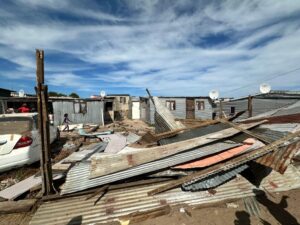Note to Editors: Please note Hannah Lidgett, MPL sound bite in English
The DA in KwaZulu-Natal (KZN) has submitted a formal written parliamentary question to several government departments in a bid to establish how the provincial administration is preparing to address climate change threats.
The transversal question (view here) – submitted to KZN’s EDTEA, COGTA and Office of the Premier – contains specific reference to the ability of KZN’s municipalities to fulfil their requirements, as outlined in the National Climate Change Act which commenced in March 2025.
According to the act, provinces have clear obligations to guide municipalities through workshops, technical guidelines, and resource planning. They are also required to be proactive in risk mitigation. This includes preparing disaster management strategies, risk-mapping, early-warning systems and creating data sets that can be used to identify at-risk areas.
The DA has requested clarity on steps taken in terms of risk mitigation. We have also requested clarity around whether KZN’s municipalities are ready to conduct impending climate assessments, as well as the submission of climate change response plans.
The act states that municipalities have one year to conduct an initial climate change needs and response assessment and two years to develop a climate change response implementation plan, both following the publication of the National Adaptation Strategy and Plan.
KZN is a high-risk province when it comes to natural disaster. The latest findings from the Intergovernmental Panel on Climate Change (IPCC) also make it clear that urgent, coordinated action is a necessity.
Global temperatures have already risen by approximately 1.1°C above pre-industrial levels, and July 2023 to June 2024 marked the hottest 12-month period on record. Every fraction of additional warming will intensify floods, droughts, and extreme weather patterns, which will place further strain on vulnerable communities and local governments.
The DA has asked the relevant provincial government departments to detail how they are supporting municipalities to develop compliant response plans, particularly in securing funding and building technical capacity. Provinces must be aligning their own strategies with expected NASP requirements, establishing pipelines of skills, data and resources, and ensuring municipalities are adequately prepared to respond swiftly once the national framework is finalised.
Equally urgent is the need to update disaster management strategies, coordinate comprehensive risk mapping, and strengthen provincial data systems to improve early-warning capabilities and decision-making. The devastating 2022 KZN floods exposed our provincial weaknesses. We must take proactive steps now to ensure that our province’s climate change response is comprehensive.
As a partner within KZN’s Government of Provincial Unity (GPU), the DA will continue to exercise robust oversight to ensure that climate change planning is prioritised and available for public scrutiny. KZN’s people must be protected from the growing risks posed by a rapidly changing climate, particularly given our vulnerability as a province.








